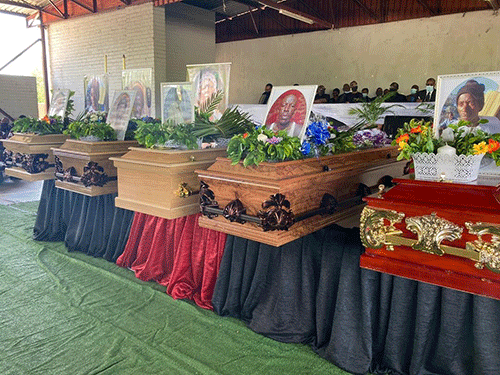CHOI – A wave of sorrow and frustration rippled through Choi and Kongola villages in the Zambezi region on Tuesday as elderly residents confronted officials about the Botswana Defence Force’s (BDF) alleged use of deadly force against Namibians.
Most of those who have fallen victim to BDF’s brunt were suspected of poaching in the protected wildlife zones along the border.
The grievances emerged during the ongoing consultative talks following the official launch of Phase Two of the Namibia- Botswana joint Civil-Military Cooperation (CIMIC) sensitisation campaign.
The effort is aimed at fostering cross-border understanding, reducing wildlife crime and preventing further bloodshed.
“They are killing our people,” said
Chrispin Mataanyambe, a respected elder in Choi.
He expressed anguish over what he described as the ongoing killings of Namibians by BDF patrols.
“They say they’re protecting animals,” he said, “but they’re taking human lives. It must come to an end.” Another elder, Jeffrey Bede, challenged both countries to uphold a shared African identity and respect for human life.
“We are supposed to be brothers,” he said.
“Why can’t we share resources in a human manner? Why must the policy be to shoot those found wanting?” he questioned.
The residents are still at pains over the deaths of Tommy, Martin and Wamunyima Nchindo as well as their cousin Sinvula Munyeme.
They were shot and killed by BDF soldiers on 5 November 2020 along the Chobe River on suspicion that they were poachers.
Botswana, however, denied having a ‘shoot-to-kill policy’.
Lieutenant Colonel Fana Maswabi of the BDF responded to the villagers’ concerns by clarifying that there is no official shoot-to-kill policy in place. “However, during operations, unfortunate incidents do occur during crossfire with armed and dangerous poachers. These can lead to loss of life,” he clarified.
He added that independent investigations – often involving both the Botswana and Namibian police – are conducted in such cases.
Legal proceedings follow where warranted.
“We lost a soldier too,” he revealed.
Morgan Sai-Sai, chief control warden for the Zambezi region, acknowledged the pain felt on both sides of the border.
He recalled a tragic 2018 incident, where a Namibian soldier was fatally shot by an armed poacher. He said the dangers in these zones are real and unpredictable.
“I’ve been doing this work for 33 years,” said Sai-Sai. “The message is simple: people must stay away from protected areas unless they go through proper channels,” he urged.
He affirmed that Botswana had made a formal commitment to move away from deadly engagements.
“Botswana said that killing is a thing of the past. They value life,” he noted.
However, he warned that escalating criminal activity could undermine those efforts.
Peace
The sensitisation campaign, running from 9 June to 5 July, aims to tackle persistent cross-border issues such as poaching, illegal crossings and smuggling.
Covering 27 villages in Namibia and 71 in Botswana, the campaign builds on the progress of its first phase in 2024.
This year’s focus stretches deeper into rural areas previously left out – particularly the vast, remote regions between Mohembo and Union’s End.
The initiative is not just about military cooperation but also about educating communities on legal avenues and reducing human-wildlife conflict. Mataanyambe continued: “Yes, protect your animals. But not by taking human life”.
The CIMIC campaign will soon move to villages in Kavango East, Omaheke, Otjozondjupa and Hardap regions.
Organisers hope that sustained community dialogue and education will replace fear with understanding, and prevent further tragedies along the border.
-anakale@nepc.com.na



